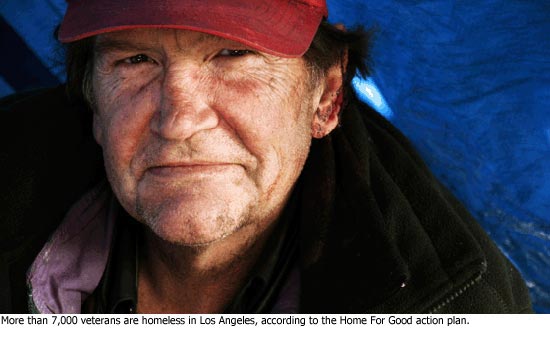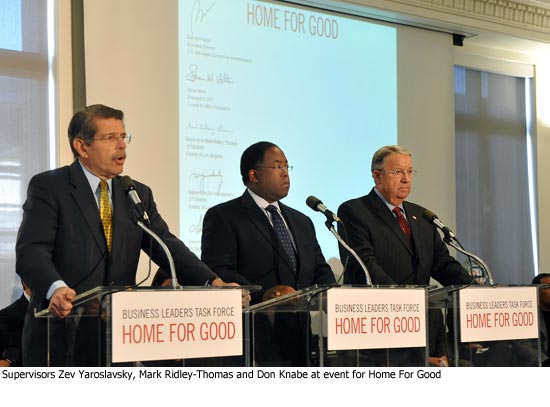A five-year plan to end homelessness
December 1, 2010
A growing number of business and political leaders in Los Angeles are rallying behind a plan that boldly promises to end chronic homelessness within five years—a plan that on Wednesday got an announced boost of $13 million from the Conrad N. Hilton Foundation.
The plan, Home For Good, calls for a sweeping reorientation of strategies and expenditures in Los Angeles County for the chronically homeless and military veterans living on the region’s streets. The goal is to provide permanent, rather than temporary, housing to these individuals, who would then immediately have access to a stream of health and mental health services to help them restore their lives.
At the same time, according to the plan, taxpayers would be saved millions of dollars now being spent by the criminal justice and emergency health care systems to cope with the county’s huge homeless population.
“We need to shift the paradigm away from a system that has been cumbersome and confusing to an efficient system focused on finding people homes,” states the report, a joint initiative of the United Way of Greater Los Angeles and the Los Angeles Area Chamber of Commerce.
This model, known as “permanent supportive housing,” has taken root in cities across the nation, including Los Angeles, where a program called Project 50 on Skid Row has shown dramatic results.
At an event on Wednesday to publicize the Home For Good action plan, a number of Los Angeles’ top officials were on hand, including Mayor Antonio Villaraigosa and Supervisor Zev Yaroslavsky, who initiated Project 50 and has backed its replication throughout his district and beyond.
During his remarks at the gathering, Yaroslavsky said that Home For Good “sets the record straight” that permanent supportive housing is the most effective approach to helping individuals who’ve been identified as the most likely to die on the streets.
Once these people are in a home—and a trusting relationship has been established—“we can open their minds and their hearts to the treatment they need, the services they need, so they can function in our society,” Yaroslavsky said. “In order to end homelessness, we’ve got to provide a home.”
Yaroslavsky’s comments were indirectly aimed at critics of the housing first approach, who argue that homeless individuals should not be given publicly supported residences unless they’re first receiving mental health care and substance abuse treatment.
That is not, however, the prevailing attitude among the unprecedented coalition of elected officials, business leaders, philanthropists, religious leaders and housing advocates who’ve endorsed the United Way/Chamber of Commerce initiative.
Permanent supportive housing also is the favored approach of the Obama Administration, as was made clear on Wednesday by Barbara Poppe, executive director of the U.S Interagency Council on Homelessness. She said the Home For Good blueprint could open the door to more federal funding. “It’s not enough to plan,” she said. “It’s only enough if we act.”
Los Angeles County Supervisor Mark Ridley-Thomas agreed, saying: “We must turn Home For Good into action. Measurable results, in the final analysis, is what matters.”
To help ensure that action, Steven M. Hilton announced that the Hilton Foundation would provide $13 million in grants, spread across three years, to fund key components of the campaign. The approach advocated by Home for Good “restores stability, autonomy and dignity and helps the individual integrate back into the community,” said Hilton, president and CEO of the foundation.
Hilton said that $9 million of grants will be given to the Corporation for Supportive Housing to spur the creation of 2,500 new permanent supportive housing units; $3.6 million will be used to identify and house 4,500 of the most vulnerable people on the streets. The rest will be distributed to other non-profit and faith-based efforts on behalf of the chronically homeless.
He called Los Angeles’ homeless problem “shameful,” and said that the homeless man on the street is “somebody’s son, father, brother. In effect, they’re one of us.”
Posted 12/1/10














 405 bridge work causes a stink
405 bridge work causes a stink

